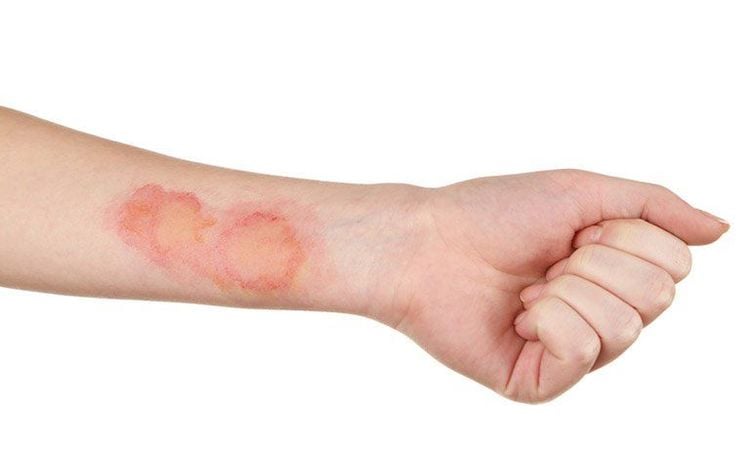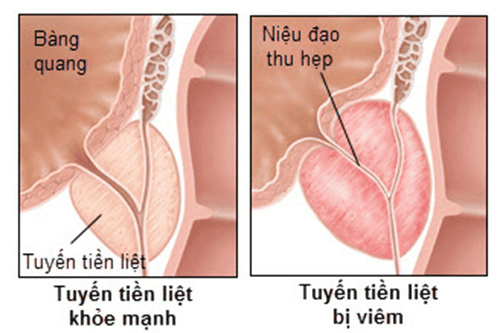Gonorrhea is a sexually transmitted infection commonly found in men and women of reproductive age. Gonorrhea can spread quickly, but not everyone knows how to prevent it or recognize the signs of the disease.
1. Symptoms of gonorrhea in men in the early stages
1.1. Urethritis
This is the most common symptom of gonorrhea in men.
After one instance of vaginal intercourse with an infected person, about 25% of men will contract the disease.
About 85% of male patients with gonorrheal urethritis will experience acute symptoms with discomfort such as:
- Painful urination and purulent discharge: purulent discharge from the urethra is specific to gonorrhea; the pus is often yellow or yellow-green in large quantities, making the patient worried.
- Swelling and redness of the urethra.
- The incubation period is 1–14 days, usually 2–5 days.
- If untreated, acute symptoms will subside after a few days to a few weeks.
About 25% of patients have no obvious symptoms; there may be urethral discharge, but it is scant and clear, making it difficult to distinguish from cases of non-gonococcal urethritis.
Some patients are asymptomatic, posing a significant risk for community spread of infection. Whether symptomatic or asymptomatic, untreated infection can lead to local complications such as:
- Posterior urethritis, causing painful urination.
- Epididymitis.
- Acute or chronic seminal vesiculitis and prostatitis.
- Cowper's gland inflammation.
- Tyson's gland inflammation.
1.2. Anorectal Infections
Anorectal infections are common in men who have sex with men; proctitis is less common. Patients may experience symptoms such as:
- Anal itching.
- Anal discharge of mucus without pain.
- Rectal bleeding sometimes occurs.
- Severe proctitis manifests as pain, tenesmus, possibly diarrhea, mucus or pus discharge, and constipation.
- On examination, the anus appears red and may contain mucus. Examination by Colonoscopy may reveal erythema, edema, friable mucosa prone to bleeding, and mucus or pus.
1.3. Pharyngeal Infections
The rate of pharyngeal infection due to gonorrhea during heterosexual intercourse in men is about 3–7%; this rate increases to 10–25% in men who have sex with men. About 90% of patients experience symptoms. Symptoms of pharyngeal infection due to gonorrhea include:
- Pharyngitis
- Acute tonsillitis
- Sometimes the patient has fever and swollen neck lymph nodes.
1.4 Infections in other organs
- Conjunctivitis: Rare in adults, caused by self-infection with gonorrhea bacteria from the genital-anal area, or by sharing towels with an infected person.
- Gonococcal skin infections can occur with ulcers on the genitals, perineum, thighs, and fingers.

2. Common complications of gonorrhea in men
2.1. Local complications
- Epididymitis: The most common complication. Nowadays, epididymitis is more often caused by Chlamydia trachomatis, or a combination of both pathogens. Patients experience symptoms such as swelling of one testicle, pain, and urethritis.
- Lymphangitis: Rare.
- Seminal vesiculitis: Rare.
- Prostatitis: Rare.
- Urethral stricture: Very rare.
- Periurethral abscess: Very rare.

2.2. Systemic Complications
- Systemic gonococcal infection: This is the most common systemic complication of gonorrhea in men. About 0.5–3% of patients with untreated acute gonorrhea will experience this complication. Manifestations include:
- Painful necrotic pustules on an erythematous base; sometimes also burning papules, pustules, blisters, and bleeding.
- Joint pain, tenosynovitis in the knees, wrists, ankles, fingers, and toes.
- Gonococcal sepsis: Clinically difficult to diagnose; culture confirmation is also difficult, with a positive rate of only 20–30%.
- Gonococcal meningitis and pericarditis: This is a very serious complication and can cause damage to heart valves, usually the aortic valve, endangering the patient's life.
The above are manifestations of gonorrhea in men, as well as the dangerous complications this disease can cause. Nowadays, gonorrhea is completely curable if detected early and if the patient complies with the treatment regimen. Therefore, everyone needs to understand the signs of this disease so that it can be detected and treated promptly, avoiding dangerous complications.
If you have unusual symptoms, you should be examined and consulted by a specialist.
To arrange an appoitment, please call HOTLINE or make your reservation directly HERE. You may also download the MyVinmec app to schedule appointments faster and manage your reservations more conveniently.













